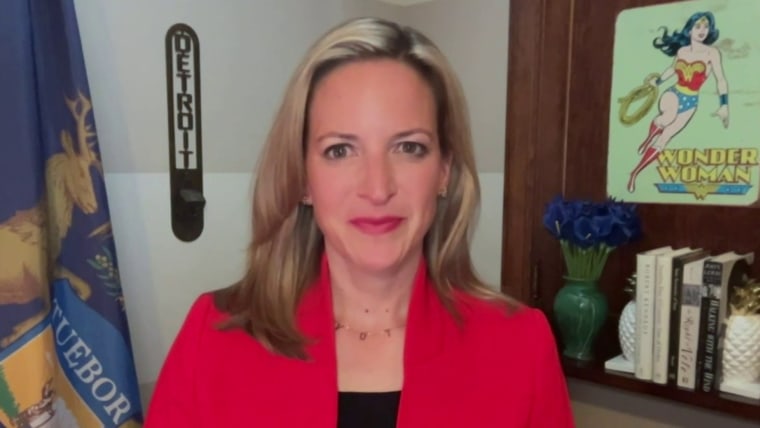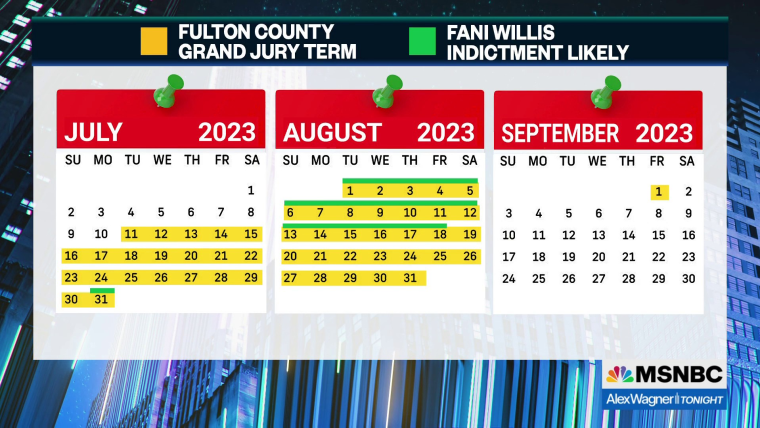We could be mere weeks away from former President Donald Trump getting hit with yet another set of criminal charges. This time the threat is coming from Georgia, where Fulton County District Attorney Fani Willis has spent the past 17 months probing Trump’s attempts to overturn the results of the 2020 election in the state. And according to previous reports, she’s aiming to decide whether to bring indictments sometime between roughly now and Sept. 1.
In an attempt to head off Willis, Trump’s lawyers on Thursday filed a petition with the Georgia Supreme Court to have the district attorney disqualified from investigating him. The filing explicitly acknowledges what a long shot their bid is — and implicitly makes clear just how worried Trump is about facing another set of charges that he potentially won’t be able to wriggle out of if re-elected.
When compared with his normal attempts to grind the judicial process to a halt, Trump urging a court to move quickly takes on a certain air of desperation.
Earlier this week, a Fulton County superior court judge seated two grand juries, one of which will hear likely evidence in the case against Trump. That likely evidence includes the final report from a special grand jury that Willis convened last year to investigate whether Trump broke state law in trying to have state officials toss out Joe Biden’s win in 2020. The full report has yet to be made public, but in February the jury foreperson said in an NBC News interview that the panel had recommended indictments against more than a dozen people — possibly including Trump.
In petitioning the Georgia Supreme Court, Trump’s lawyers are seeking to both quash that report and get a ruling that would prevent Willis from using any of the evidence the special grand jury obtained in support of possible charges. But this isn’t the first time that Trump has tried to disqualify her from the case — his legal team filed a similar petition to quash the special grand jury report with the Fulton County Superior Court in March. And much like in the current Supreme Court filing, that previous attempt included “a kitchen sink of legal arguments” thrown at Willis’ probe, as my colleague Jordan Rubin described it.

But Judge Robert McBurney has yet to issue a ruling on that filing. Trump’s lawyers say that leaves him “stranded between the Supervising Judge’s protracted passivity and the District Attorney’s looming indictment.” Their argument in a nutshell: Willis and McBurney, who is also a respondent to the petition along with Willis, are being unfair to Trump. They then conclude that the only course of action is to have the Georgia Supreme Court leapfrog not just the appeals courts but pre-empt the initial ruling.
When compared with his normal attempts to grind the judicial process to a halt, Trump urging a court to move quickly takes on a certain air of desperation. In the filing his lawyers acknowledge that there has been no case in which the Georgia Supreme Court has accepted a petition of original jurisdiction in the past 40 years. It also reflects the fact that in a way the threat of charges from Willis is the biggest threat to him in the long-term.
Willis’ investigation presents a potential worst-case scenario for Trump.
The federal charges that he faces in the Mar-a-Lago classified documents case are serious, to be sure. So is the potential chance that special counsel Jack Smith indicts Trump on his role in the lead-up to the Jan. 6, 2021, attack on the U.S. Capitol. But a conviction in either case still wouldn’t necessarily prevent Trump from serving as president if re-elected — and as soon as he’s sworn-in he could theoretically pardon himself even before a verdict comes in either case.
There’s no chance of that in the hush money case that Manhattan District Attorney Alvin Bragg brought against Trump in March. State-level convictions can’t be overturned using the presidential pardon power, leaving him vulnerable on that front. But the legal argument that Bragg has used to prosecute his case is a relatively novel one that doesn’t guarantee a conviction against the former president.
Willis’ investigation presents a potential worst-case scenario for Trump. There’s plentiful evidence at this point that showcases his attempts to reverse Biden’s win, including his infamous call to have officials “find” 11,780 votes for him. There’s also the little matter of his team recruiting a slate of “fake electors” to submit fraudulent Electoral College votes for him to Congress. Any case against Trump in Georgia has the potential to combine the severity of Smith’s case with the jurisdictional threat that Bragg’s represents into one massive legal problem.
The odds seem low that Trump will succeed in this Hail Mary play. But that he’s having his lawyers give it a shot anyway speaks to how determined he is to prevent this case from moving forward. And in the meantime, the clock is ticking away before Willis potentially makes Trump’s summer much, much worse.

